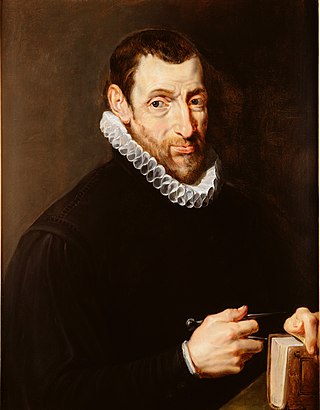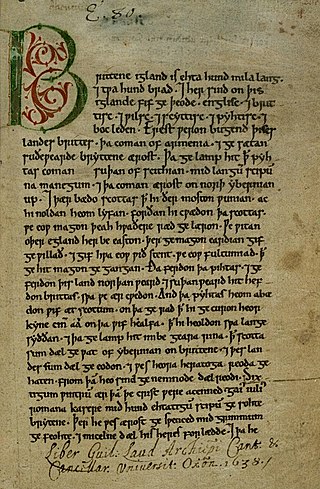Related Research Articles
Ælfric of Eynsham was an English abbot and a student of Æthelwold of Winchester, and a consummate, prolific writer in Old English of hagiography, homilies, biblical commentaries, and other genres. He is also known variously as Ælfric the Grammarian, Ælfric of Cerne, and Ælfric the Homilist. In the view of Peter Hunter Blair, he was "a man comparable both in the quantity of his writings and in the quality of his mind even with Bede himself." According to Claudio Leonardi, he "represented the highest pinnacle of Benedictine reform and Anglo-Saxon literature".

The Junius manuscript is one of the four major codices of Old English literature. Written in the 10th century, it contains poetry dealing with Biblical subjects in Old English, the vernacular language of Anglo-Saxon England. Modern editors have determined that the manuscript is made of four poems, to which they have given the titles Genesis, Exodus, Daniel, and Christ and Satan. The identity of their author is unknown. For a long time, scholars believed them to be the work of Cædmon, accordingly calling the book the Cædmon manuscript. This theory has been discarded due to the significant differences between the poems.

Christophe Plantin was a French Renaissance humanist and book printer and publisher who resided and worked in Antwerp. He established in Antwerp one of the most prominent publishing houses of his time, the Plantin Press. It played a significant role in making Antwerp a leading centre of book publishing in Europe. The publishing house was continued by his successors until 1867.

The Lacnunga ('Remedies') is a collection of miscellaneous Anglo-Saxon medical texts and prayers, written mainly in Old English and Latin. The title Lacnunga, an Old English word meaning 'remedies', is not in the manuscript: it was given to the collection by its first editor, Oswald Cockayne, in the nineteenth century. It is found, following other medical texts, in the British Library's Harley MS 585, a codex probably compiled in England in the late tenth or early eleventh century. Many of its herbal remedies are also found, in variant form, in Bald's Leechbook, another Anglo-Saxon medical compendium.

The Plantin–Moretus Museum is a printing museum in Antwerp, Belgium which focuses on the work of the 16th-century printers Christophe Plantin and Jan Moretus. It is located in their former residence and printing establishment, the Plantin Press, at the Vrijdagmarkt in Antwerp, and has been a UNESCO World Heritage Site since 2005.
Layamon's Brut, also known as The Chronicle of Britain, is a Middle English alliterative verse poem compiled and recast by the English priest Layamon. Layamon's Brut is 16,096 lines long and narrates a fictionalized version of the history of Britain up to the Early Middle Ages. It was the first work of history written in English since the Anglo-Saxon Chronicle. Named for Britain's mythical founder, Brutus of Troy, the poem is largely based on the Anglo-Norman French Roman de Brut by Wace, which is in turn a version of Geoffrey of Monmouth's Latin Historia Regum Britanniae. Layamon's poem, however, is longer than both and includes an enlarged section on the life and exploits of King Arthur. It is written in the alliterative verse style commonly used in Middle English poetry by rhyming chroniclers, the two halves of the alliterative lines being often linked by rhyme as well as by alliteration.

Pseudo-Apuleius is the name given in modern scholarship to the author of a 4th-century herbal known as Pseudo-Apuleius Herbarius or Herbarium Apuleii Platonici. The author of the text apparently wished readers to think that it was by Apuleius of Madaura (124–170 CE), the Roman poet and philosopher, but modern scholars do not believe this attribution. Little or nothing else is known of Pseudo-Apuleius.

Byrhtferth was a priest and monk who lived at Ramsey Abbey in Huntingdonshire in England. He had a deep impact on the intellectual life of later Anglo-Saxon England and wrote many computistic, hagiographic, and historical works. He was a leading man of science and best known as the author of many different works. His Manual (Enchiridion), a scientific textbook, is Byrhtferth's best known work.

The Stowe Psalter is a psalter from the "2nd or 3rd quarter of the 11th century", at the end of Anglo-Saxon art. The text includes the Gallican version of the Psalms, followed by the Canticles with an interlinear Old English gloss.

Bald's Leechbook is a medical text in Old English and Medieval Latin probably compiled in the mid-tenth century, possibly under the influence of Alfred the Great's educational reforms.

The Anglo-Saxon Chronicle is a collection of annals in Old English, chronicling the history of the Anglo-Saxons.

The Cleopatra Glossaries are three Latin-Old English glossaries all found in the manuscript Cotton Cleopatra A.iii. The glossaries constitute important evidence for Old English vocabulary, as well as for learning and scholarship in early medieval England generally. The manuscript was probably written at St Augustine's, Canterbury, and has generally been dated to the mid-tenth century, though recent work suggests the 930s specifically.
Hatton Gospels is the name now given to a manuscript produced in the late 12th century or early 13th century. It contains a translation of the four gospels into the West Saxon dialect of Old English. It is a nearly complete gospel book, missing only a small part of the Gospel of Luke. It is now in the Bodleian Library, Oxford, as MS Hatton 38. The fullest description of the manuscript is by Takako Kato, in Treharne, et al., eds., Production and Use of English Manuscripts, 1020-1220.
The Royal Prayer Book is a collection of prayers believed to have been copied in the late eighth century or the early ninth century. It was written in West Mercia, likely either in or around Worcester.

The Tiberius Psalter is one of at least four surviving Gallican psalters produced at New Minster, Winchester in the years around the Norman conquest of England. The manuscript can now be seen in full online at the British Library website.

The Épinal-Erfurt glossary is a glossary of Old English. It survives in two manuscripts. It has been described as "the earliest body of written English", and is thought to have been compiled at Malmesbury for Aldhelm.
The Corpus Glossary is one of many Anglo-Saxon glossaries. Alongside many entries which gloss Latin words with simpler Latin words or explanations, it also includes numerous Old English glosses on Latin words, making it one of the oldest extant texts in the English language.
Dirk Imhof is a Belgian book historian, author and museum curator specializing in rare books and rare maps of Renaissance Europe, particularly the activities and output of Christopher Plantin and his successor Jan Moretus at the Plantin Press in 16th-century Antwerp.
The Harley Glossary is an Anglo-Saxon glossary, mostly providing glosses on Latin words.
The Excerptiones Prisciani is a tenth-century compilation of Priscian's Institutiones grammaticae and Donatus's Ars maior.
References
- 1 2 David W. Porter, 'On the Antwerp-London Glossaries', Journal of English and Germanic Philology, 98 (1999), 170–92.
- ↑ Max Förster, 'Die Altenglische Glossenhandscrift Plantinus 32 (Antwerpen) und Additional 32246 (London),' Anglia 41 (1917), 94-161; doi : 10.1515/angl.1917.1917.41.94.